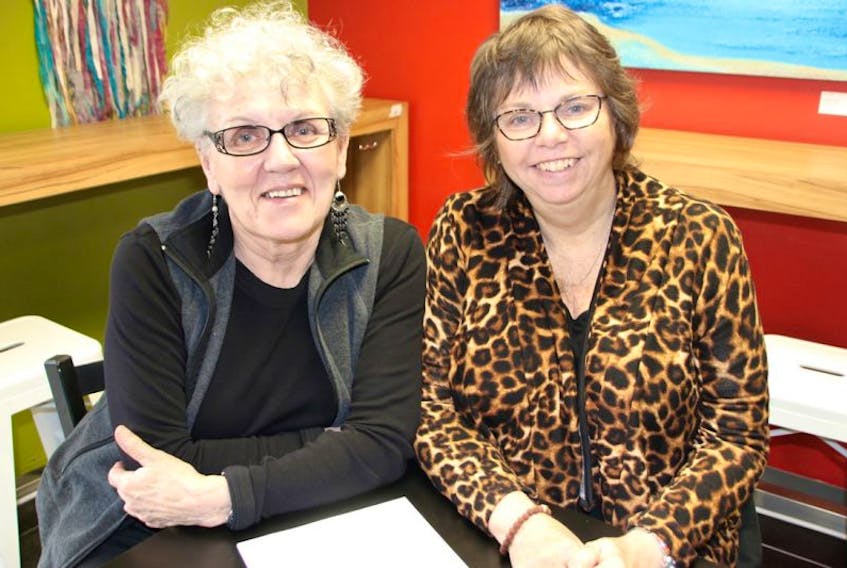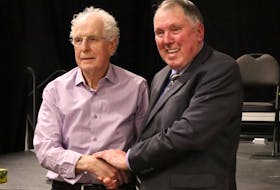They have become active human rights educators on a path that would lead them to speak before the United Nations.
Jeanne Sarson and Linda MacDonald have presented to the UN several times, in both North America and Europe, and will do so in New York this month as members of a panel.
“We got involved after hearing Sarah’s story,” said Sarson. “She was beaten, cut, shocked, burnt, whipped, caged, starved, raped, drugged and had limbs dislocated.”
Sarah was also forced to participate in bestiality, and all of these things began happening when she was a young child.
The nurses were unable to find torture-informed support for her so they decided to provide what support they could. This led to research, writing papers, presentations and writing a chapter (Seeking Equality – Justice and Women’s and Girls’ Human Right Not to Be Subjected to Non-State Torture) for the book “Women, Law and Culture: Conformity, Contradiction and Conflict.”
They were invited to contribute to the book after meeting the editor, a barrister and human rights lawyer from England, at a Commission on the Status of Women event in New York.
In the Canadian Criminal Code there’s no law against ‘non-state torture.’ While some feel aggravated assault is suitable for dealing with such cases, the women disagree.
“Without saying it in words they’re pretty well saying that non-state torture is not as important as state torture,” said MacDonald. “People wouldn’t feel it fit to call state torture assault.”
There are places, including France, Queensland (Australia) and California, that have brought in legislation addressing non-state torture.
“There are no centres for rehabilitation for the survivors; that’s something that’s lacking all over the world,” said MacDonald. “We’re making some progress and we’ll keep at it until there’s a shift.”
She and Sarson formed Persons Against Non-State Torture and address issues including trafficking and ritual abuse-torture.
They don’t think people understand that non-state torture isn’t something that only happens in third world countries or large cities.
“It’s happening around us,” added MacDonald. “No country has evolved enough that we’re not harming one another and there’s no such thing as a day off when you’re an activist.”
More information on the battle against non-state torture can be found at www.nonstatetorture.org .
They have become active human rights educators on a path that would lead them to speak before the United Nations.
Jeanne Sarson and Linda MacDonald have presented to the UN several times, in both North America and Europe, and will do so in New York this month as members of a panel.
“We got involved after hearing Sarah’s story,” said Sarson. “She was beaten, cut, shocked, burnt, whipped, caged, starved, raped, drugged and had limbs dislocated.”
Sarah was also forced to participate in bestiality, and all of these things began happening when she was a young child.
The nurses were unable to find torture-informed support for her so they decided to provide what support they could. This led to research, writing papers, presentations and writing a chapter (Seeking Equality – Justice and Women’s and Girls’ Human Right Not to Be Subjected to Non-State Torture) for the book “Women, Law and Culture: Conformity, Contradiction and Conflict.”
They were invited to contribute to the book after meeting the editor, a barrister and human rights lawyer from England, at a Commission on the Status of Women event in New York.
In the Canadian Criminal Code there’s no law against ‘non-state torture.’ While some feel aggravated assault is suitable for dealing with such cases, the women disagree.
“Without saying it in words they’re pretty well saying that non-state torture is not as important as state torture,” said MacDonald. “People wouldn’t feel it fit to call state torture assault.”
There are places, including France, Queensland (Australia) and California, that have brought in legislation addressing non-state torture.
“There are no centres for rehabilitation for the survivors; that’s something that’s lacking all over the world,” said MacDonald. “We’re making some progress and we’ll keep at it until there’s a shift.”
She and Sarson formed Persons Against Non-State Torture and address issues including trafficking and ritual abuse-torture.
They don’t think people understand that non-state torture isn’t something that only happens in third world countries or large cities.
“It’s happening around us,” added MacDonald. “No country has evolved enough that we’re not harming one another and there’s no such thing as a day off when you’re an activist.”
More information on the battle against non-state torture can be found at www.nonstatetorture.org .









